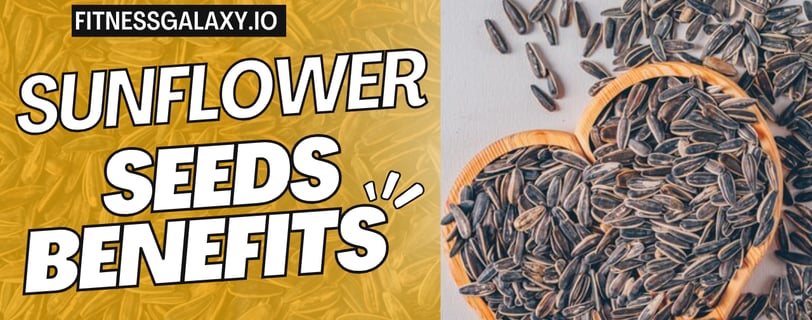Sunflower Seeds: Composition and Benefits
Sunflower seeds, derived from the sunflower plant (Helianthus annuus), have gained popularity worldwide as a nutrient-dense snack and a valuable ingredient in numerous recipes. These small, kernel-like seeds are more than just tasty—they’re packed with nutrients that offer remarkable health benefits. This article delves into the composition of sunflower seeds and highlights their benefits for your health and well-being.
MEN & WOMEN
12/2/20243 min read


Sunflower Seed Ingredients
Sunflower seeds are typically harvested from the head of the sunflower plant, with each flower capable of producing up to 2,000 seeds. These seeds are encased in black and white striped husks, although they are often consumed without the husk. Their nutrient-rich composition makes them a rich source of essential vitamins, minerals, and macronutrients.
Macronutrients
Protein: Sunflower seeds are an excellent source of plant-based protein, providing about 5.5 grams per ounce (28 grams). Protein is essential for muscle repair, enzyme production, and overall cellular health.
Fat: About 80% of the fat in sunflower seeds is unsaturated fat, consisting primarily of monounsaturated and polyunsaturated fatty acids. These healthy fats contribute to cardiovascular health and reduce harmful cholesterol levels.
Carbohydrates: Sunflower seeds have a low glycemic index and contain about 6.5 grams of carbohydrates per ounce, most of which is in the form of dietary fiber, which aids digestion and maintains stable blood sugar levels.
Micronutrients
Sunflower seeds contain abundant amounts of vitamins and minerals, including:
Vitamin E: A powerful antioxidant that protects cells from oxidative damage and supports healthy skin.
B vitamins: Especially folic acid (B9), which is essential for DNA synthesis and healthy fetal development.
Magnesium: Essential for muscle function, nerve signal transmission, and maintaining a regular heartbeat.
Selenium: Plays a vital role in thyroid function and acts as a powerful antioxidant.
Zinc: Supports immune function and promotes skin repair.
Iron: Important for oxygen transport and energy production.
Phytonutrients
Sunflower seeds contain a variety of bioactive compounds, including phenolic acids and flavonoids, which have antioxidant and anti-inflammatory properties.
Calories
One ounce of sunflower seeds contains about 160 calories, making them a rich source of nutrients.
Benefits of Sunflower Seeds
The diverse composition of sunflower seeds translates into numerous health benefits. Here's a closer look at how these seeds positively impact your health.
Heart Health
The healthy fats in sunflower seeds, particularly monounsaturated and polyunsaturated fats, help lower levels of bad cholesterol (LDL) and increase good cholesterol (HDL). Additionally, magnesium helps regulate blood pressure, reducing the risk of cardiovascular disease. The vitamin E content in the seeds also prevents oxidative damage to heart tissue.
Improved Skin Health
Vitamin E is an essential nutrient for maintaining healthy skin. It acts as a powerful antioxidant, fighting free radicals that cause premature aging. Eating sunflower seeds can enhance skin radiance and reduce the risk of skin conditions like eczema.
Improve Digestive Health
The dietary fiber in sunflower seeds aids digestion by promoting regular bowel movements, which helps prevent constipation and supports the growth of beneficial gut bacteria.
Boost Your Immune System
Sunflower seeds are rich in selenium and zinc, two essential nutrients for strengthening the immune system. Selenium enhances the body's ability to fight infection, while zinc plays a pivotal role in wound healing and immune cell production.
Improve Mental Health
The magnesium in sunflower seeds is linked to reducing symptoms of anxiety and depression. It also plays a role in neurotransmitter function and regulates the stress response system.
Strengthen Your Bones
Sunflower seeds provide magnesium and phosphorus, both of which are essential for maintaining strong, healthy bones. These nutrients, along with protein, make sunflower seeds beneficial for skeletal health.
Support Thyroid Function
Selenium in sunflower seeds contributes to healthy thyroid function by helping produce its hormones and protecting it from oxidative stress.
Blood Sugar Control
Sunflower seeds have a low glycemic index, meaning they don't cause a sudden spike in blood sugar levels. Their fiber content also slows sugar absorption, making them suitable for diabetics or those seeking to stabilize blood sugar levels.
Weight Management
Despite their calorie density, sunflower seeds can aid in weight management. Their combination of protein, healthy fats, and fiber promotes satiety and reduces overall calorie intake.
Reducing Inflammation
The antioxidants and healthy fats in sunflower seeds help reduce inflammation in the body, reducing the risk of chronic diseases such as arthritis and cardiovascular disease.
How to Incorporate Sunflower Seeds into Your Diet
Sunflower seeds are versatile and can be incorporated into your diet in a variety of ways:
As a snack: Roasted sunflower seeds are a popular and easy-to-prepare snack. Choose unsalted or low-salt varieties for a healthier option.
In salads: Sprinkle sunflower seeds over salads for a crunch and nutrient boost.
In baked goods: Use sunflower seeds in muffins, breads, or granola bars for added flavor and nutritional benefits.
In smoothies: Blend sunflower seeds into smoothies for a creamier texture and protein boost.
As a butter: Sunflower seed butter is a great alternative to peanut or almond butter, especially for those with nut allergies.
The Bottom Line
Sunflower seeds are a nutrient-dense superfood that offers countless health benefits. From improving heart health and skin tone to boosting mental health and supporting the immune system, these tiny seeds are nutritionally valuable beyond their price. Whether enjoyed as a snack or added to meals, sunflower seeds are a delicious and versatile addition to a healthy diet.
By including sunflower seeds in your daily routine, you're not only satisfying your taste buds but also contributing to your long-term health and well-being.
Follow us on social media
Explore fitness articles and personal training options.
Fitness Jobs
© 2024. All rights reserved.
